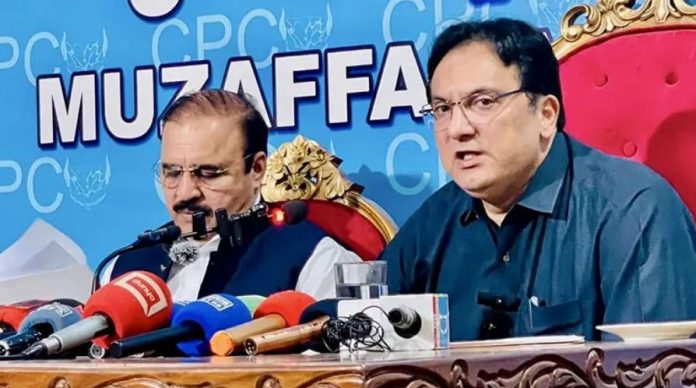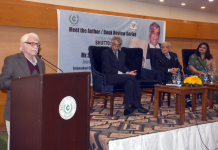Azad Jammu and Kashmir: Three more ministers from the Azad Jammu and Kashmir (AJK) cabinet on Friday announced their resignation, with two of them calling upon Prime Minister Chaudhry Anwarul Haq to step down for what they described as his “failure to safeguard the constitutional rights of Kashmiri refugees”.
Earlier this week, AJK Information Minister Pir Mazhar Saeed announced that he had resigned from his position, citing “some unavoidable reasons”. However, a senior official at the AJK prime minister’s office told Dawn.com that the resignation had been “received but not yet accepted”.
AJK Finance Minister Abdul Majid Khan and Food Minister Chaudhry Akbar Ibrahim announced today they would step down at a joint press conference at the Muzaffarabad Press Club, while Sports, Youth and Culture Minister Asim Sharif Butt sent his resignation directly to the prime minister, opting to stay away from media interaction.
All three were elected on PTI tickets in the 2021 general elections from LA-45 (Valley-VI), LA-38 (Jammu-V) and LA-42 (Valley-III) — constituencies reserved for Kashmiri refugees who migrated to Pakistan after 1947. However, the trio had later joined the faction of PTI defectors led by PM Haq in 2023.
Their resignations came in protest against the agreement recently signed by a seven-member federal government committee and the Joint Awami Action Committee (JAAC), which, among other matters, addressed the contentious issue of the 12 legislative assembly seats reserved for Kashmiri refugees settled across Pakistan.
Calling the JAAC an “unelected, baton-wielding group”, Khan and Ibrahim said the accord had effectively legitimised an “unconstitutional and morally indefensible demand, reached under pressure and without wider consultation”.
They alleged that the deal violated the fundamental rights of thousands of Kashmiri refugees and struck at the heart of AJK’s constitutional and political framework.
They maintained that the campaign against the refugee seats was a malicious move by a small group of traders and self-styled representatives pursuing narrow interests “under the guise of reforms”.
The real target, they asserted, was not the government but the identity, representation and political recognition of the refugee community that had made immense sacrifices for Pakistan and the cause of Kashmir’s accession.
Both ministers argued that these seats were not a privilege but a historic and conscious constitutional decision, which was part of AJK’s political setup since 1947. The reserved seats, they said, symbolised the constitutional acknowledgment of the sacrifices and long displacement endured by those who lost everything for the cause of Pakistan.
They termed the JAAC’s questioning of these seats’ existence a denial of the pain, identity and political significance of an entire generation exiled for its struggle for accession to Pakistan.
They said they had brought this issue to the notice of the president and prime minister of Pakistan in black and white, and added that they would “knock on all doors to frustrate the designs of the elements hellbent upon creating a wedge between local and migrant Kashmiris and thus damaging the Kashmir cause”.
Khan also shared his two-page resignation letter, in which he reaffirmed his belief in the ideology of the State of Jammu and Kashmir’s lawful accession and integration with Pakistan, in accordance with the wishes of its entire population, including the 2.5 million Pakistan-based refugees.
He said it had become “utterly impossible to continue to serve under the present government, which has failed to effectively defend and protect the constitutional rights of Kashmiri refugees, nor shown the will to assume responsibility or challenge this serious constitutional violation”.
Declaring that he had no moral choice but to resign from the AJK cabinet, effective today, Khan vowed to continue defending the rights of Jammu and Kashmir refugees and to raise his voice for their rightful place in the political and constitutional structures of both AJK and Pakistan.
In his resignation letter, Ibrahim echoed similar views, stating that Prime Minister Haq had failed to stop the “unlawful demand” raised by the JAAC and to protect the rights of around three million Pakistan-based refugees from occupied Jammu and Kashmir.
Both Khan and Ibrahim charged PM Haq of conspiring against the refugee members of the legislative assembly and called upon him to resign from office.
Butt, in his letter, expressed his and his constituents’ loss of confidence in the AJK government in the wake of the agreement, saying he could no longer remain part of it.
Talks between the JAAC, the AJK government and federal ministers over elite privileges and reserved seats for refugees broke down at the end of September.
Since then, rival groups staged protests and strikes, trading blame for the violence which marred what began as a largely peaceful movement in AJK. Fierce clashes between protesters and law enforcers left at least 10 people dead and scores critically injured in the territory.
On October 2, a delegation from the federal government travelled to Muzaffarabad for talks with the JAAC in a bid to put an end to the ongoing unrest in the territory. The agreement was signed after two rounds of talks.

















